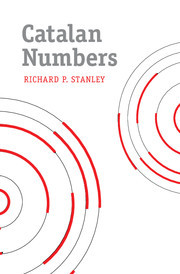Description
Catalan Numbers
Author: Stanley Richard P.
More than 250 exercises and solutions on properties and applications of Catalan numbers, at levels ranging from recreational to research.
Language: English
Subject for Catalan Numbers:
Approximative price 35.19 €
In Print (Delivery period: 14 days).
Add to cart
Catalan Numbers
Publication date: 03-2015
222 p. · 15.3x23 cm · Paperback
Publication date: 03-2015
222 p. · 15.3x23 cm · Paperback
Approximative price 76.05 €
In Print (Delivery period: 14 days).
Add to cart
Catalan Numbers
Publication date: 03-2015
224 p. · 15.7x23.5 cm · Hardback
Publication date: 03-2015
224 p. · 15.7x23.5 cm · Hardback
Description
/li>Contents
/li>Biography
/li>
Catalan numbers are probably the most ubiquitous sequence of numbers in mathematics. This book gives for the first time a comprehensive collection of their properties and applications to combinatorics, algebra, analysis, number theory, probability theory, geometry, topology, and other areas. Following an introduction to the basic properties of Catalan numbers, the book presents 214 different kinds of objects counted by them in the form of exercises with solutions. The reader can try solving the exercises or simply browse through them. Some 68 additional exercises with prescribed difficulty levels present various properties of Catalan numbers and related numbers, such as Fuss-Catalan numbers, Motzkin numbers, Schröder numbers, Narayana numbers, super Catalan numbers, q-Catalan numbers and (q,t)-Catalan numbers. The book ends with a history of Catalan numbers by Igor Pak and a glossary of key terms. Whether your interest in mathematics is recreation or research, you will find plenty of fascinating and stimulating facts here.
1. Basic properties; 2. Bijective exercises; 3. Bijective solutions; 4. Additional problems; 5. Solutions to additional problems.
Richard P. Stanley is a Professor of Applied Mathematics at the Massachusetts Institute of Technology. He is universally recognized as a leading expert in the field of combinatorics and its applications to a variety of other mathematical disciplines. He won the AMS 2001 Leroy P. Steele Prize for Mathematical Exposition for his books Enumerative Combinatorics, Volumes 1 and 2, which contain material that form the basis for much of the present book.
© 2024 LAVOISIER S.A.S.




